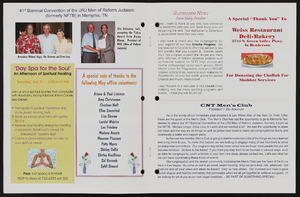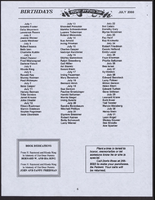Search the Special Collections and Archives Portal
Search Results
Nevada Desert Experience Records
Identifier
Abstract
The Nevada Desert Experience Records (1951-2009) are comprised of files from the anti-nuclear organization, the Nevada Desert Experience (NDE), as well as its predecessor, the Sagebrush Alliance, and those of earlier unincorporated protests at the Nevada Test Site (NTS). Materials include board of directors meeting minutes, financial records, scrapbooks, personnel records, event speeches, correspondence, newspaper clippings, cartoons and other artwork, newsletters, brochures, fliers, research files on nuclear issues and other anti-nuclear organizations, and congressional testimony. The records also contain audiovisual materials, photographic prints and slides, screenplays, manuscripts, and newspapers related to the NDE's media efforts.
Archival Collection
Kiel Family Photographs
Identifier
Abstract
The Kiel Family Photographs (approximately 1854-1989) contains glass plate negatives of members of the Kiel and George families, as well as neighbors from the Stewart and Wilson ranches and ranch workers. The majority of the photographs were taken at the Kiel Ranch site in North Las Vegas, Nevada. The collection consists of the original glass plate negatives, as well as photographic print and negative duplicates made using the originals.
Archival Collection
Henry and Anita Schuster Papers
Identifier
Abstract
Collection is comprised of correspondence, speeches, essays, meeting minutes, photographs, research materials, publications, press clippings, awards, and event programs (1941-2011) that document the life of Henry Schuster, and his work with his wife Anita. Materials are mainly related to the Holocaust and to Holocaust memory and survivor organizations (especially the Holocaust Survivor's Group of Southern Nevada, which the couple founded, and L’Œuvre de Secours aux Enfants). Genealogical information is also included, as well as records of Henry Schuster’s time in the U.S. Army and his studies at the Manhattan Technical Institute.
Archival Collection
Pueblo Grande de Nevada Manuscript Collection
Identifier
Abstract
The Pueblo Grande de Nevada Manuscript Collection (1924-1983) contains journal articles, photocopies of artifact inventories, reports, correspondence, and field notes related to the Pueblo Grande de Nevada archaeological site located in the Overton Valley of Southern Nevada. The bulk of the materials are related to Mark R. Harrington's archaeological reports, journal articles, and data from sites throughout the Overton and Moapa valleys. The collection also includes materials related to the Boulder Dam Park Museum (Lost City Museum of Archaeology) located in Overton, Nevada, which housed many of the artifacts and photographs from Harrington's archaeological sites.
Archival Collection
Blanche Zucker-Bozarth Papers
Identifier
Abstract
The Blanche Zucker-Bozarth Papers document education advocate Blanche Zucker-Bozarth's volunteer work and activism in libraries, children's advocacy, and women’s clubs in Las Vegas, Nevada from 1963 to 2005. The collection includes records, newspaper clippings, and photographs from her political activism and fundraising initiatives in Southern Nevada. The collection also includes buttons, video tapes, and journal articles on child abuse prevention, as well as records from Zucker-Bozarth's term as president of the Mesquite Club in the 1980s.
Archival Collection

Pete Barbutti interview, September 24, 2008: transcript
Date
Archival Collection
Description
Pete Barbutti (also spelled Barbuti) played the accordion, the piano, and the trumpet. He was also a comedian and appeared numerous times on the Tonight Show starring Johnny Carson and toured with Nat King Cole. He and his family have lived in Las Vegas since 1960
Text

Transcript of interview with Roscoe Wilkes by Claytee White, March 19, 2009
Date
Archival Collection
Description
Roscoe Wilkes was born in Bonanza, Colorado, and moved with his family to Pioche, Nevada for what his sister called a 75-year pit stop. Soon after their move to this rural Nevada town, Roscoe’s mother became a widow, raising two children during the Depression. Like many families in Pioche, the Wilkes’ made due with what they had, and were creative in sustaining their livelihoods. Roscoe has never stood still. Before enlisting in the military, Roscoe worked various jobs, as a PBX systems operator, a lead zinc miner, and grade school teacher, before enlisting. During World War II, Roscoe became a prisoner of war in Romania, and was rescued a few months later when the Germans began retreating. Returning to the United States after his release, he relocated to a base in California, and married. As soon as Roscoe was relieved of his military service, he took advantage of the then new G.I. Bill and enrolled in the University of Southern California School of Law. He immediately took his degree to Pioche, soon becoming its district attorney, and later a judge. He spent 18 years based in Seattle as a federal administrative law judge, hearing cases prosecuted by the Coast Guard. Roscoe ended his 45-year career in law in 1990, and moved to Boulder City, where four generations of Wilkes live.
Text

Transcript of interview with John E. Jeffrey by Frank Vivirito, April 1, 1976
Date
Archival Collection
Description
On April 1, 1976, Frank Vivirito interviewed John E. Jeffrey (born July 20th, 1938, in Sioux City, Iowa) about his life in Southern Nevada. Jeffrey discusses his occupational history and the disparity of work conditions and opportunities for Black and Mexican workers in the Henderson plant. The interview concludes with a brief description of Jeffrey’s family’s medical history.
Text


